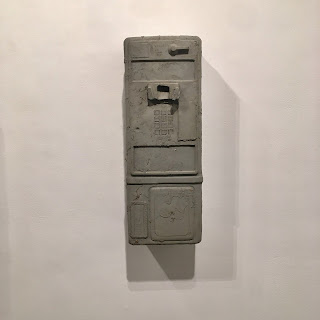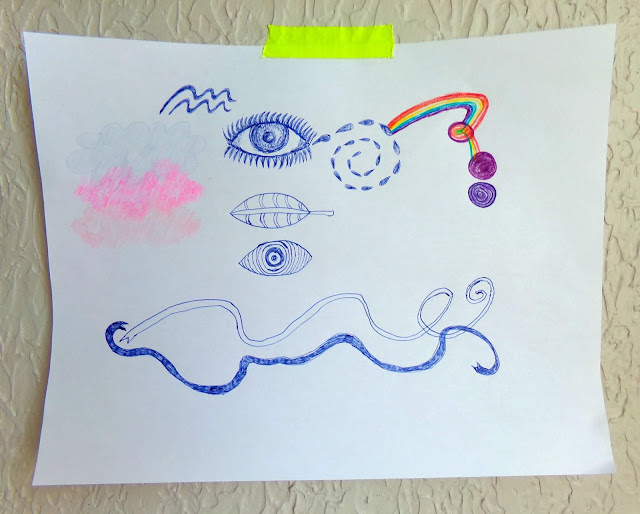IF YOU WOULD LIKE TO PLACE A CALL
The Front, New Orleans
and
An UNNAMED GUY on an UNNAMED PODCAST
A long time ago I read a "clever student" anecdote. My two-minute Google research told me that it's most
likely an academic legend (like an urban legend). Here is one version: a philosophy
professor assigned a final exam essay question: What is courage? The exam had a
minimum length requirement of some number of pages. One student responded with a two word essay that read, This
is.
When I read that, I liked it. Something about the less-is-more "courage" of minimalism appealed to me.
 |
| Srdjan Loncar, From If You Would Like to Place a Call at The Front |
A few weeks ago I went to The Front, my
first time out to look at art since the confinement. In the fourth gallery
there was a show I really wanted to like. Or maybe it's more accurate to say I loved and hated it. It moved and disappointed me. I wanted to like it because it was
based on a gesture I deeply appreciated. (I have been thinking more and more
about the gesture of art rather than the thing of art.)
The show was a group of works by Srdjan Loncar. The gesture was that the artist had paid attention to derelict pay phones around the city. The thing he had made was a concrete pay phone, mounted it on the wall. It was perfect. But there were three of them. In addition to the three concrete pay phones, there was another sculpture, and a map, a photograph and some wall text.
The show was a group of works by Srdjan Loncar. The gesture was that the artist had paid attention to derelict pay phones around the city. The thing he had made was a concrete pay phone, mounted it on the wall. It was perfect. But there were three of them. In addition to the three concrete pay phones, there was another sculpture, and a map, a photograph and some wall text.
I really like pay phones. I mean I have noticed them, paid attention. I have taken photographs of pay phones and phone booths for at least 15 years, though not "obsessively" as the kids say. I like the way pay phones stand (or stood as they near extinction) solitary. I like them especially in rural or suburban places, sometimes lit sometimes with glass booths. Pay phones call attention to the absence of a caller. They are communication devices, which front-load them with
meaning. There was a great story by producer Miki Meek on This
American Life. It was called “Really Long Distance” and about a phone booth in Japan that
offered the thousands of people who lost loved ones in the 2011 tsunami and
earthquake to call the departed. I say all of this because I am the choir: broken or abandoned pay phones are, from my view, totally relevant fodder for art-making.
I would have love love loved to have walked into that gallery and seen a single concrete pay phone on the wall. If there had been one sculpture in the gallery, it would have been just me and an non-functioning pay phone, two entities interacting and I can feel how powerful that would have been. Instead, the experience was less economical and less poetic. And I just feel disappointed when art becomes too project-y.
If courage in the anecdote was two words, one pay phone might be its sculptural corollary. What is courage? That would have been.
Artists work in solitude and have only so many opportunities or official spaces to share what they have made. Artists also have economic or career interests in being "out there" as much as possible which can lead to the impulse to pack a space or over-explain with words or quantities. Forces can lead an artist away from minimalism. A beautiful, solitary, deeply real gesture (like installing a concrete pay phone) can often get swallowed up by “art making” and art statements. These phone booths are also, according to the artist statement, installed around town. If I had encountered one accidentally in public I know I would have been thrilled (provided there was no artist statement nearby describing the meaning of it).
I would have love love loved to have walked into that gallery and seen a single concrete pay phone on the wall. If there had been one sculpture in the gallery, it would have been just me and an non-functioning pay phone, two entities interacting and I can feel how powerful that would have been. Instead, the experience was less economical and less poetic. And I just feel disappointed when art becomes too project-y.
If courage in the anecdote was two words, one pay phone might be its sculptural corollary. What is courage? That would have been.
Artists work in solitude and have only so many opportunities or official spaces to share what they have made. Artists also have economic or career interests in being "out there" as much as possible which can lead to the impulse to pack a space or over-explain with words or quantities. Forces can lead an artist away from minimalism. A beautiful, solitary, deeply real gesture (like installing a concrete pay phone) can often get swallowed up by “art making” and art statements. These phone booths are also, according to the artist statement, installed around town. If I had encountered one accidentally in public I know I would have been thrilled (provided there was no artist statement nearby describing the meaning of it).
Speaking of beautiful gestures, I was listening to a podcast
on which the guest, well-known in several circles, was prompted by the host to
direct listeners to his books, website, etcetera in what the host calls the
“plug zone.” The guest plugged his projects then gave his phone number, his actual phone number in case, he said, anyone wanted to call or text him. (I
am not naming names here because I do not want to alter his gesture.) The host was incredulous. Is that your actual
phone number? It was. This was a strange and and fearless gesture. Maybe this was courage.
What is courage? How does courage relate to gestures, quantities, lots versus one? How does courage relate to withholding or sharing? I don't know...What do you think? Hello? Hello?
What is courage? How does courage relate to gestures, quantities, lots versus one? How does courage relate to withholding or sharing? I don't know...What do you think? Hello? Hello?












